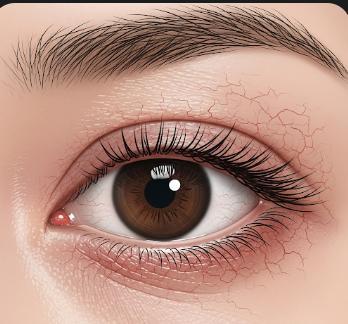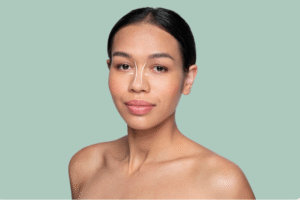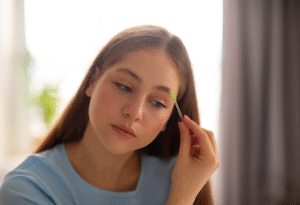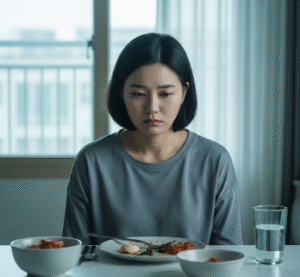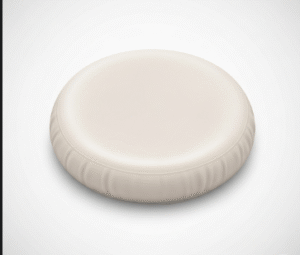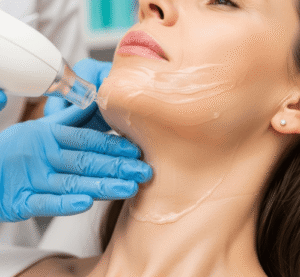Overview
Dry eyelids, medically referred to as eyelid xerosis, occur when the skin around the eyes loses its natural moisture. This condition can lead to itching, flaking, redness, and general discomfort. While often mild, persistent dryness can significantly affect daily comfort, appearance, and eye health. In Korea, dermatology and ophthalmology clinics provide advanced care for patients experiencing dry eyelids.
Highlights:
➤ Common condition: Affects both adults and children
➤ Environmental triggers: Dry climates, air conditioning, pollution
➤ Potential chronicity: Can be temporary or long-lasting depending on underlying causes
Key Facts
➤ Prevalence: Dry eyelids are widespread, especially during winter or in low-humidity regions.
➤ Age affected: Older adults are more prone due to thinning skin, though any age can be affected.
➤ Gender: Both men and women equally experience this condition.
➤ Impact: Chronic discomfort can affect sleep, concentration, and appearance.
What is Dry Eyelids?
Dry eyelids refer to parched or dehydrated skin on or around the eyelid area. Because eyelid skin is extremely thin and delicate, it is more vulnerable to dryness than other parts of the body.
Highlights:
➤ Early symptoms: Mild tightness, slight itching
➤ Progressive signs: Flaking, redness, scaling
➤ Underlying conditions: Eczema, blepharitis, or seborrheic dermatitis can worsen dryness
What Symptoms Are Related to Dry Eyelids?
➤ Redness: Inflamed eyelid margins
➤ Itching/Burning: Ranges from mild irritation to strong discomfort
➤ Flaking/Scaling: Skin may peel similar to dandruff
➤ Swelling/Puffiness: Often results from rubbing the eyes
➤ Sensitivity to skincare or makeup: Certain products can aggravate dryness
➤ Blurred vision (rare): Typically caused by rubbing or secondary dry eye
What Causes / Possible Causes
➤ Environmental factors: Low humidity, wind, air conditioning
➤ Skin conditions: Eczema, psoriasis, seborrheic dermatitis
➤ Aging: Reduced natural oils lead to thinner skin
➤ Allergies/Contact dermatitis: From cosmetics, cleansers, or eye drops
➤ Eye conditions: Dry eye syndrome often occurs alongside dry eyelids
➤ Medications: Retinoids, antihistamines, and other drugs may reduce skin moisture
Highlights:
➣ Chronic exposure to irritants or allergens can make dry eyelids more severe
➣ Combination of internal (health/aging) and external (environment/products) factors often contributes
When Should I See My Doctor?
➤ Persistent dryness: Lasts more than two weeks despite home care
➤ Severe redness, pain, or swelling: Could indicate infection or inflammation
➤ Crusting or oozing: Signs of bacterial or fungal involvement
➤ Vision changes: Blurred vision or sensitivity to light requires urgent evaluation
➤ Frequent recurrence: Chronic dryness may need specialist attention
Highlights:
➣ Early consultation with a dermatologist or ophthalmologist is recommended
➣ In Korea, advanced clinics provide comprehensive care and preventive advice
Care and Treatment
➤ Moisturizing: Apply gentle, fragrance-free creams or ointments designed for eyelids
➤ Avoid irritants: Reduce use of harsh cleansers, chemical-based products, or makeup
➤ Warm compresses: Help open oil glands, restoring natural moisture
➤ Environmental adjustments: Use humidifiers indoors, protect eyes from wind and sun
➤ Healthy diet: Omega-3 fatty acids and hydration support skin health
➤ Eyelid hygiene: Gentle cleaning of eyelid margins reduces debris and prevents inflammation
Highlights:
➣ Consistency is key; daily care prevents recurrence
➣ Avoid scratching to reduce risk of infection
Treatment Options in Korea
Medical Treatments:
➤ Prescription ointments: Corticosteroids or immunomodulators for severe inflammation
➤ Antibiotic ointments: For bacterial blepharitis or secondary infections
➤ Allergy management: Antihistamines or anti-allergic eye drops
Advanced Procedures:
➤ Lid hygiene therapy: Heat or laser-based devices to open clogged Meibomian glands
➤ Phototherapy/dermatology treatments: For eczema or psoriasis affecting eyelids
Rehabilitation & Follow-Up Care:
➤ Combined dermatology and ophthalmology approach ensures holistic treatment
➤ Follow-up visits help monitor progress and prevent recurrence
➤ Education on proper eyelid care improves long-term outcomes
Highlights:
➣ Korea offers specialized clinics with advanced technology for eyelid and eye surface health
➣ Treatment is customized based on severity and underlying cause
Summary:
Dry eyelids are a common condition that can range from mild irritation to chronic discomfort. Proper identification of causes, consistent care, and advanced treatment options in Korea can effectively restore moisture, relieve irritation, and prevent recurrence. With structured hygiene routines, appropriate moisturization, and professional care, patients can maintain healthy, comfortable eyelids and improve overall eye health.

